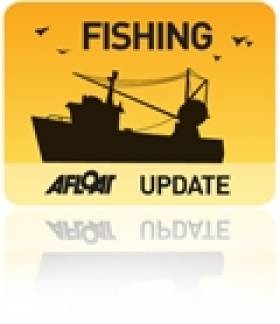Displaying items by tag: aquaculture
Programme for Government will Reinstate Marine Department
It maybe the second last item on the programme for government issued by Enda Kenny and Eamon Gilmore yesterday but the indications are good that the marine sector will see a reinstated Department of the Marine. the Fine Gael and Labour coalition say 'marine responsibilities will be merged under one Department, for better co-ordination in policy delivery'. Here is the relevant excerpt:
Coastal communities, fisheries & marine environment
We will negotiate the best possible deal for fishermen in the review of the Common Fisheries Policy.
We will support the development of sustainable aquaculture and fish farms by streamlining the licensing process and reducing associated bureaucracy.
Marine responsibilities will be merged under one Department, for better co-ordination in policy delivery. We will develop an integrated marine and coastal planning process in order to maximise the potential of Ireland's coastline in fishing, aquaculture, ocean energy and tourism.
A Sea Fisheries Sustainability Impact Assessment, based on consultation with all major stakeholders, will be brought before the Dáil annually before EU fisheries negotiations commence.
We will replace criminal sanctions system for minor fisheries offences with administrative sanction system to bring Ireland into line with other European jurisdictions. Safety at sea and decent working conditions must underpin the development of the fisheries sector. We will explore the provision of an emergency towing vessel for the Coastguard.
Fine Gael Pledges to 'Steer the Marine' in Election Manifesto
Fine Gael has pledged to reinstate the Department of the Marine in its election manifesto published today. Under the heading 'steering the marine' Fine Gael also says it will replace the Boards of all State Port companies and Harbour Commissions within one year of entering government. The full chapter dealing with Marine is below:
1.11 Supporting the Seafood Sector and Marine
Expanding the Industry: Fine Gael believes Ireland, as an island nation with a strong and valued fishing tradition has huge potential to succeed as a serious competitor in the international seafood sector. The seafood industry currently generates annual revenues of €718 million and provides direct employment for 11,000 people. With an estimated 40 million tonnes of seafood to be required annually by 2030, there is significant scope for further expansion.
Common Fisheries Policy:
We will negotiate the best possible deal for Irish fishermen in the context of the ongoing review of the Common Fisheries Policy. Our priorities are:
• A progressive reduction of discards, fishery by fishery and in all maritime regions in the EU.
• Protection of the Hague Preferences.
• A uniform and transparent regulation regime.
• A clear, independently audited database of infringements across the EU.
• The development of a sustainable aquaculture plan.
• A strong focus on seafood marketing, labelling and country of origin to ensure imports meet the same
standards on safety, hygiene, traceability, recall, information and audit.
Sea Fisheries Bill:
We will publish legislation to replace the criminal sanctions system for minor fisheries offences with an administrative sanction system to bring Ireland into line with other European jurisdictions.
Funding for Fisheries:
Fianna Fáil and Green Party in-fighting has limited Ireland's ability to draw down EU funds for seafood development. We will resolve difficulties blocking the drawdown of available funds. Aquaculture Licensing: An additional 42 million tonnes of farmed seafood will be required to keep pace with demand each year by 2030, just 20 years away. We must increase our raw material supply and expand our aquaculture sector. We will remove administrative obstacles and clear the backlog of aquaculture licences currently preventing the creation of thousands of jobs in the aquaculture sector.
Value Added Products:
Currently, 85% of all Irish seafood is commodity traded. There is a significant opportunity to generate more value from this raw material base. Fine Gael will task Bord Iascaigh Mhara with assisting Irish companies in adding value to their products through innovation.
Single Food Label:
We will create and market a single label for all Irish produce and will drive a targeted marketing campaign to grow the Irish brand in new markets.
1.12 Steering the Marine
Marine Department:
Marine and fisheries policy is currently spread across three Departments. Fine Gael will merge these responsibilities under one Department for better co-ordination in policy delivery.
National Marine and Coastal Plan:
We will develop an integrated marine and coastal planning process to reach the full potential of our coastline in fishing, aquaculture, ocean energy and tourism.
Ports Development:
We will support the development of our ports and marine sector as important drivers of economic growth. We will also replace the Boards of all State Port companies and Harbour Commissions within one year of entering government.
The manifesto is HERE
Seafood Firm Meets Ministers Over Expansion Plans
Minister for Fisheries and Food Brendan Smith and Minister of State Sean Connick have met one of the world’s biggest seafood companies to discuss the potential for expansion of the industry in Ireland, The Irish Times reports.
Marine Harvest, which presently employs 250 people in Ireland and 5,000 worldwide, hopes to produce 10-12,000 tonnes of premium salmon for export from its fish farms in Donegal, Mayo, Cork and Kerry in 2012.
The company sees potential to double its production and employment in Ireland over the next 10 years and discussed with the ministers how the marine infrastructure can best accommodate this.
“I see enormous potential for the expansion of both finfish and shellfish aquaculture," said Minister Connick.






























































